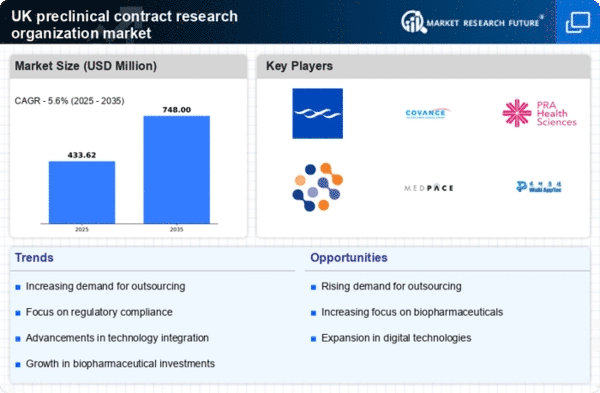Growing Regulatory Scrutiny
Growing regulatory scrutiny is a critical driver impacting the preclinical cro market, as regulatory bodies in the UK impose stringent requirements for drug development. The need for compliance with evolving regulations has led pharmaceutical companies to engage preclinical CROs to navigate the complex landscape of regulatory submissions. This trend is underscored by the increasing number of clinical trial applications, which have risen by 15% in the past year. Preclinical CROs are instrumental in ensuring that studies meet regulatory standards, thereby facilitating smoother transitions to clinical phases. The emphasis on data integrity and transparency further amplifies the demand for preclinical CRO services. As regulatory frameworks continue to evolve, the reliance on preclinical CROs is expected to grow, reinforcing their significance in the drug development ecosystem.
Investment in Biotechnology
Investment in biotechnology is a significant driver for the preclinical cro market, particularly in the UK. The biotechnology sector has witnessed substantial financial backing, with investments reaching approximately £2.5 billion in 2025. This influx of capital is primarily directed towards research and development activities, which often require the expertise of preclinical CROs. As biotechnology firms seek to advance their product pipelines, they increasingly rely on CROs for preclinical testing and validation. The collaboration between biotech companies and preclinical CROs is likely to foster innovation and expedite the development of novel therapeutics. Furthermore, the UK government has implemented various initiatives to support biotechnology, enhancing the overall ecosystem and creating a conducive environment for preclinical CROs to thrive.
Focus on Personalized Medicine
The shift towards personalized medicine is reshaping the preclinical cro market, as stakeholders seek tailored therapeutic solutions. This trend is particularly pronounced in the UK, where the emphasis on precision medicine is gaining traction. the preclinical contract research organization market is adapting to this paradigm by offering specialized services that cater to the unique needs of individual patients. As a result, the demand for biomarker discovery and patient stratification studies is on the rise. It is estimated that the market for personalized medicine in the UK will grow at a CAGR of 10% over the next five years. This growth presents a significant opportunity for preclinical CROs to align their services with the evolving landscape of drug development, thereby enhancing their value proposition in the industry.
Emergence of Advanced Therapeutics
The emergence of advanced therapeutics, including gene and cell therapies, is a transformative force in the preclinical cro market. In the UK, the regulatory landscape is evolving to accommodate these innovative treatment modalities, which require specialized preclinical testing. The market for advanced therapeutics is projected to reach £3 billion by 2027, underscoring the potential for growth in this sector. Preclinical CROs are increasingly tasked with conducting rigorous preclinical studies to ensure the safety and efficacy of these novel therapies. This trend necessitates a high level of expertise and technological capability, positioning preclinical CROs as essential partners in the development of advanced therapeutics. As the demand for these therapies continues to rise, the role of preclinical CROs in the research and development process is likely to expand.
Rising Demand for Drug Development
the preclinical contract research organization market is experiencing a notable surge in demand driven by the increasing need for innovative drug development. As pharmaceutical companies strive to bring new therapies to market, the reliance on preclinical contract research organizations (CROs) has intensified. In the UK, the market for drug development is projected to reach £5 billion by 2026, indicating a robust growth trajectory. This demand is further fueled by the growing prevalence of chronic diseases, which necessitates extensive research and development efforts. Consequently, preclinical CROs are positioned to play a pivotal role in supporting these initiatives, providing essential services such as toxicology studies and pharmacokinetics assessments. The increasing complexity of drug candidates also necessitates specialized expertise, thereby enhancing the relevance of preclinical CROs in the drug development landscape.
















